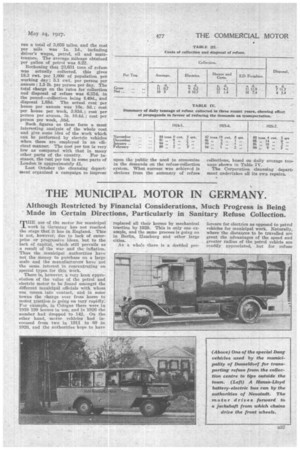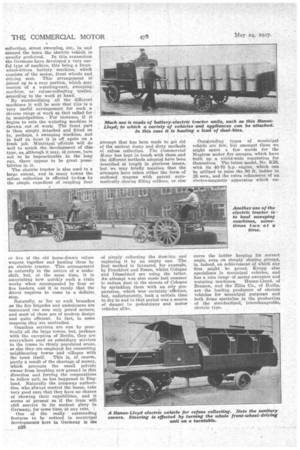THE MUNICIPAL MOTOR IN GERMANY.
Page 127

Page 128

If you've noticed an error in this article please click here to report it so we can fix it.
Although Restricted by Financial Considerations, Much Progress is Being " Made in Certain Directions, Particularly in Sanitary Refuse Collection.
MHE use of the motor for municipal
work in Germany has not reached the stage that it has in England. This is not, however, due to lack of enterprise or progressive ideas, but to the lack of capital; which still prevails as a result of the war and the inflation. Thus the municipal authorities have not the money to purchase on a large scale and the manufacturers have not the same interest in concentrating on special types for this work.
There is, however, a very keen appreciation of the value of the petrol and electric motor to be _found amongst the different municipal officials with whom one cornea into contact, and in scone towns the change over from horse to motor_ traction is going on very rapidly: For example, in Cobagne there were in 1919 199 horses in use, and in 1926 the number had dropped to 142. On the other .hand, motor vehicles had increased from two in 1911 to 80 in 1926, and the anthorities hope to have replaced ail their horses by mechanical traction by 1929. This is only one example, and the same process is going on in Berlin, Hamburg and other large cities.
As a whole there is a decided pre
ference for electries as opposed to petrol vehicles for municipal work. Naturally, where the distances to be travelled are great the advantages of the speed and greater radius of the petrol Vehicle are readily appreciated, but for refuse
collecting, street sweeping, ete„ in and around the town the electric vehicle isusually preferred. In this connection the Germans have developed a very useful type of machine, this being, a frontwheel-driven ,battefy "machine;which consists of the motor, front wheels and driving seat. This arrangement is joined up to a rear portion, which may consist of a watering-cart, sweeping' machine, or refuse-collecting trailer, according to the work at hand.
By standardizing all the different machines it will be seen that this is a Very useful arrangement for such a diverse range of work as that called for• in municipalities. • For instance, if it bngins to rain the watering machine is thrown _out of work: The front part is then simply detached and fitted on to, perhaps, a sweeping machine, and in half an hour it is off again on a fresh job. Municipal nAlleiala will do well to watch ,the, development of this type, as, although it may, of course, turn out to be impracticable in the long run, there appear to be great possibilities in it.
The electric tractor is also used to a large extent, and in many towns the refuse collection is effected to-da3a by the simple expedient of coupling ,four
or five of the old horse-drawn refuse wagons together and hauling them by an electric tractor. This arrangement is naturally in the nature of a makeshift, but, at the same time, it is astonishing how quickly such a train works when accompanied by four or five loaders, arid it is rarely that the driver requires to come to a definite_ stop.
Naturally, ac far as such branches as the fire brigades and ambulances are concerned one sees only petrol motors, and raostnaf these are of modern design and quite efficient. .In fact, in some respects they are unrivalled.
Omnibus services are sun by practically all the large towns, but, perhaps with the exception of Berlin, they are everywhere used as subsidiary services to the trams in thinly populated areas, or else they are employed for connecting neighbouring towns and villages with the town itself. This is, of course, partly a result of the shortage of money, which prevents the small Private owner from breaking new ground in this direction and forcing the corporations to follow suit, as has happened in England. Naturally the tramway authorities, who always control the buses, take very good care that they,have no chance of showing their capabilities,_ and it seems at present as if the tram will still survive in its ancient glory in Germany, for some time, It any rate.
One of the really outstanding features to be noticed in municipal developments here in Germany is the
B38 attempt that has been made to get rid of the ancient dusty and dirty methods of refuse collection. The Commercial Motor has kept in touch with these and the different methods adopted have been described at length in previous issues, but we may briefly mention that the attempts have taken either the form of enclosed wagons with patent automatically closing filling orifices, or else of simply collecting the dust-bin and replacing it by an empty one. The first method is favoured, for example, by Frankfort and Essen, whilst Cologne and Dfisseldorf are using the latter. An attempt was also made last summer to reduce dust in the streets of Cologne by sprinkling them with an oily preparation, which was certainly efficient, but, unfortunately, took a certain time to dry in and in that period was a source of danger to pedestrians and motor vehicles alike.
• Outstanding types of municipal vehicle are' few, but amongst these we might spare a few words for the Magirus motor fire escapes, which have built up a world-wide reputation for themselves. The latest model, No. K26, with its ,40-70 h.p... engine, which can be utilized to raise the 90 ft. ladder in 25 secs., and the extra refinement of an, electro-magnetic apparatus which en cures the ladder keeping its correct angle, even on steeply sloping ground, is, indeed, an achievement of which any firm might be proud. Krupp also specializes in municipal vehicles, and has a nice range of motor sweepers and watering machines. Hansa-Lloyd, of Bremen, and the Elite Co., of Berlin, are the leading producers of electric vehicles for municipal purporps and both firms specialize in the production of the standardized, interchangeable, electric type.




















































































































































































